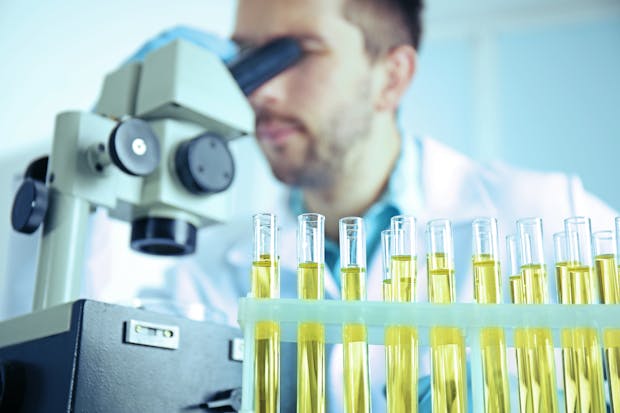
The human immune system is actually quite good at killing cancer cells. In fact, we believe it does so quite frequently. People who have AIDS or have had an organ transplant have suppressed immune systems and go on to develop cancer more often than healthy individuals. And as people age, their immune systems don’t work as well and they develop cancer more often.
But sometimes a tumour grows faster than the immune system can cope with, or can hide from the immune system’s surveillance. Many researchers are now trying to boost the immune system to create new and more effective treatments than conventional techniques such as chemotherapy.
For the last 19 years, I have been looking for proteins in the body that could help stimulate the immune system to kill cancer. And my colleagues and I have now discovered that one of these proteins could also be used to diagnose ovarian cancer much earlier than was thought possible. If it could be used in a simple urine test, it could pave the way for survival rates to increase from around 20% to as much as 90% for patients who have this protein in their wee.
These proteins are known as antigens, meaning they are recognised by the immune system. My interest in these proteins has earned me the nickname “the antigen miner” from grant reviewers. I have looked for antigens in leukaemias, lymphomas, colon cancer and, most recently, ovarian cancer.
The biggest discovery I have worked on was the realisation that a cancer-specific antigen can also provide insights into how cancer starts and develops. Some of these proteins can even indicate how long a patient is likely to survive.
In these cases, we call the proteins “biomarkers”. They can also indicate the best treatments for someone’s cancer by telling clinicians which type of cancer someone has or by indicating what is the best treatment. This could improve the chances of patient survival and prevent time and money being wasted on treatments that are unlikely to work and only offer harsh side effects.

My favourite type of biomarker is one that could help us diagnose cancer sooner, and early diagnosis can make a huge difference to survival rates. Most ovarian cancer is diagnosed when it has reached stage III, when five-year survival rates are less than 20%.
But if we could diagnose patients earlier, in stages I or II, using a non-invasive urine test, that could massively increase patient survival, because we’d be treating patients while the tumour was small and more responsive to the treatment. In fact, the survival rate for patients with stage I of the disease is around 90%.
We realised that cancer-specific antigens could also be biomarkers because we looked at some of the antigens we had found and, with help from my colleague Professor Ken Mills, noted how some were associated with patient age, sex, disease subtype and survival. This has led us to identify one specific biomarker as a sign of ovarian cancer.
Making a diagnosis
We’re now looking to see if we can find this biomarker in urine. It’s a small protein and may well be excreted in this way. If it is, then we could adapt a pregnancy test to detect the biomarker instead of pregnancy hormones. Then it could be used to provide a simple screening test for early stage ovarian cancer.
Biomarkers are already used to detect other cancers such as prostate cancer via blood tests. And high levels of the biomarker CA125 in the blood can be an indicator of ovarian cancer. But these tests don’t give us enough information to make a diagnosis, and high levels of the biomarker don’t necessarily mean someone has ovarian cancer.
In many cases, it is best to look for several different biomarkers to get the information we need. It may be that urine tests of the future will look for biomarkers of both early and later stages of ovarian cancer, maximising the chance of detecting ovarian cancer before the patient develops symptoms.![]()
Barbara Guinn, Head of Biomedical Sciences, University of Hull
This article is republished from The Conversation under a Creative Commons license. Read the original article.